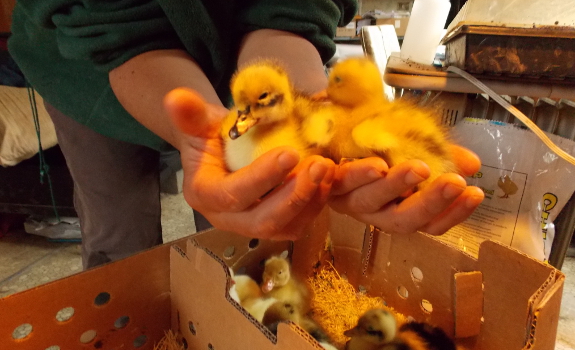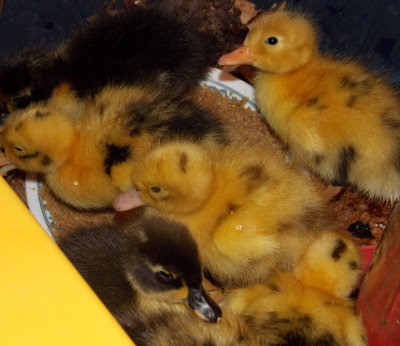
Simplifying ducklings

Since I don't have any
experience with ducks, I'm doing everything by the book at first.
(In case you're curious, "the book" means the duck chapter in The Resilient Gardener combined with Storey's Guide to Raising Ducks.) But I'm already starting to wonder which troublesome aspects of duckling care I can safely change.
First up is the waterer
situation. Ten ducklings managed to empty a pint of water out of a
traditional waterer in an hour and a half, and I suspect most of that
liquid ended up in their bedding or feathers. Although ducks do
need to submerged their heads from time to time to  clean their eyes, I'm wondering if a nipple-based waterer can be their primary drinking source if I give them an open container of water once a day for eyeball purposes.
clean their eyes, I'm wondering if a nipple-based waterer can be their primary drinking source if I give them an open container of water once a day for eyeball purposes.
Books also recommend that
you not brood chicks and ducklings together, the primary reason being
that ducks empty their waterers all over the bedding and all over the
chicks, making the latter sick. But if we keep the bedding dry
with a better waterer, perhaps it will be okay to raise all 36
fluffballs in the same place? I'm on the fence about this one,
though, because it would be pretty interesting to keep feed consumption
data on both types of birds separately (although that would also require
Mark to build another outdoor brooder).
The other big difference
between chicks and ducklings is that the latter need more niacin in
their diet. I plan to offer the ducklings some brewer's yeast
instead of a chemical supplement, but I've also read that the real
solution is to make sure ducklings have access to plenty of bugs.
That shouldn't be a problem since we'll have them out on pasture by next
week!
Want more in-depth information? Browse through our books.
Or explore more posts by date or by subject.
About us: Anna Hess and Mark Hamilton spent over a decade living self-sufficiently in the mountains of Virginia before moving north to start over from scratch in the foothills of Ohio. They've experimented with permaculture, no-till gardening, trailersteading, home-based microbusinesses and much more, writing about their adventures in both blogs and books.
Want to be notified when new comments are posted on this page? Click on the RSS button after you add a comment to subscribe to the comment feed, or simply check the box beside "email replies to me" while writing your comment.

Anna and Mark,
Ducks need a lot more water than chickens, most importantly to clear their nostrils. They also need water while they are eating, and yes, they definitely spread a lot of water around. However, we, and many others, raise chickens and ducks together with no problems. We have found the large plastic founts to be the best for ducks - they don't clog and they allow the ducks to submerge their beaks to clear their nostrils. In addition we use plastic mortar mixing troughs for the ducks to bathe and swim. After they are grown, we pasture them in the enclosure around our pond, and also provide a plastic fount for water next to their food in their duck house, which is a predator-proof enclosure. Adult ducks get herded into the duck house at night and get locked in until morning - otherwise they are sitting ducks for predators.
Harry
Ducks absolutely LOVE, and I mean LOVE water for play, for health, and mating rituals. They will drink and play in any water source. They LOVE mud!!! They need water when they eat. They love to put their food in the water. Do not be alarmed at how nasty the water will get....they don't care. Poop free water and Ducks do not mix.....:o) If you fret over it you will be changing their water 5 times a day. Once is sufficient.
They are so comical, and fun to watch. You will notice that they are very timid too....they will all move together but will wait until one is brave enough to do so. So cute.
Anna just use common sense and they'll be fine. They live in the wild without human help. I got ours because a clutch of them showed up in my small frog pond. I was so excited about it too. I knew nothing about Ducks but read a little bit on the internet and that was that.
Be aware that they will die from heat. They need water to keep cool. I lost two the first summer. But now I keep lots of water around.
Happy Ducking.....
Greetings, One lesson I learned is no water in the coop for the ducks. No matter how tip-proof the container is, they will get their bedding and the floor soaked, so they don't need it at night (when they're bigger). I use the shallow and deep plastic livestock water troughs (30 gallon and 50 gallon) as well as small-sized kiddie pool. They spit mud and food into their water, so it essentially ferments and bubbles if it's not changed. I tend to change all of their water 1x per day, but sometimes 1x every other day. It's truly quite wasteful as far as water goes, so I have located our garden next to their pen and dump the containers in that direction. We had nice pumpkins, lettuce, carrots and leeks from the dirty water last year. Ducks are a different animal than chickens, but I prefer them here in the Pacific Northwest. Have fun with your flocks!